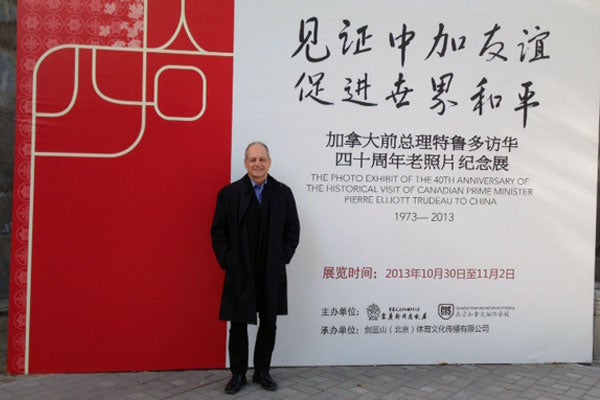
President Gertler visits alumni, partner universities in China
Published: November 22, 2013
Just weeks after delivering an inaugural address that called on the University of Toronto to strengthen its international partnerships, President Meric Gertler travelled to Beijing and Hong Kong to meet with alumni, senior government officials and his counterparts at leading universities.
The trip demonstrates the significance of the University’s ties with important partners in China, Gertler said – from the region’s distinguished U of T graduates to the prestigious academic institutions that collaborate with U of T on research and education.
"U of T’s roots in the Asia-Pacific region span more than one hundred years of collaboration, exchange and achievement,” said Gertler. “Since the 19th century, our outstanding students from the Asia-Pacific region have benefited from a U of T education and the University has in turn been inspired and enriched by our extraordinary Asia-Pacific scholars, partners, collaborators, alumni and friends.”
Today, said Gertler, thousands of Canadian students of Asian heritage attend U of T, along with nearly 6,000 students, from the Asia-Pacific region. And numerous faculty collaborate on research projects, publications and symposia.
Gertler began his trip in Beijing November 19, where he met with leaders from two of China’s most distinguished universities, the University of Peking and Tsinghua University, and co-hosted an alumni reception with Canadian ambassador Guy Saint-Jacques. The president will visit Hong Kong next week to take part in U of T’s ninth Asia-Pacific graduation ceremony – a celebration held every three years.
In his official installation address November 7, Gertler identified strengthening international partnerships as a strategic priority for U of T, along with enriching undergraduate education and learning and embracing the University’s important role in Toronto.
“At a time when we are keen to expand our role as a city-building institution at home, it makes particularly good sense for us to leverage our partnerships with other great universities in other great world cities,” said Gertler, adding U of T must “focus our resources on these international partnerships, allowing us to deepen and develop these relationships to foster not just student mobility and faculty exchanges, but also joint research projects, joint conferences, and joint teaching.”
U of T’s academic partners in the region include Peking University, Tsinghua University, Shanghai Jiao Tong University, Fudan University, the University of Hong Kong and the Shanghai Institute for Biological Sciences. Students and faculty collaborate across a variety of fields such as: neuroscience; nanotechnology; political science; biophysics; hematology; critical care medicine; cancer and diabetes. Those collaborations comprise a wide range of joint research projects, faculty exchanges, post-doctoral fellowships and student exchanges.
“The flow of ideas, knowledge and people between U of T and institutions in the region is delivering broad benefits to our societies,” Gertler said. “The path well known alumni, such as Norman Bethune (MD 1916), and others pioneered decades ago is still being advanced today. Together with their colleagues in the Asia-Pacific region, our faculty, staff, and students are helping build a better world.”



